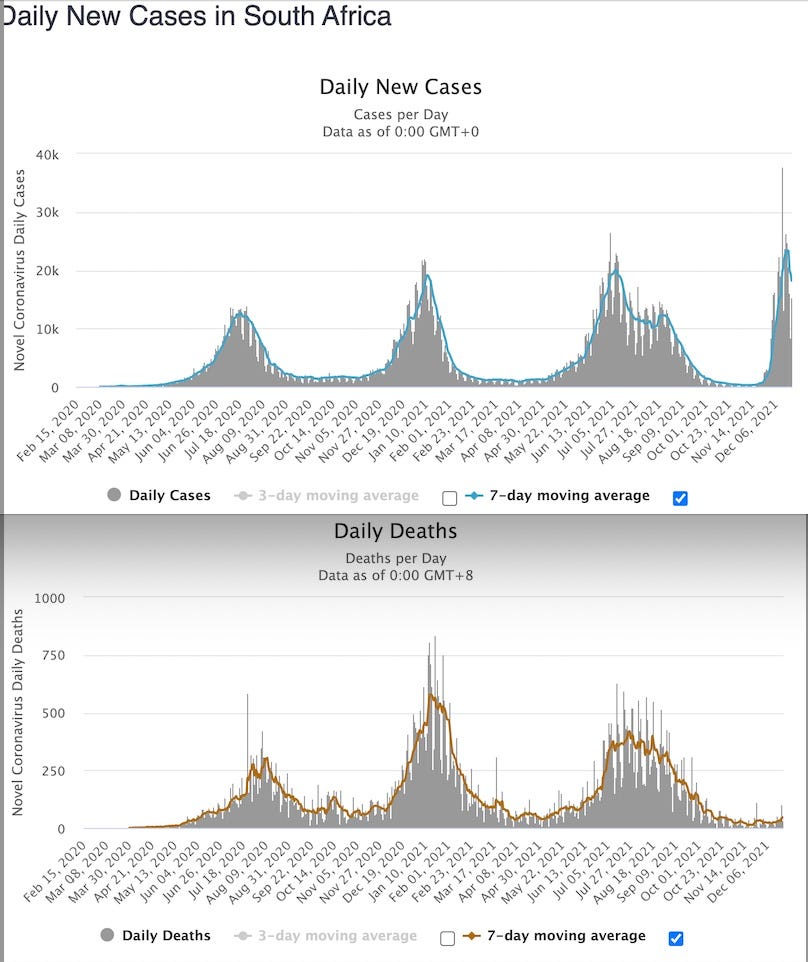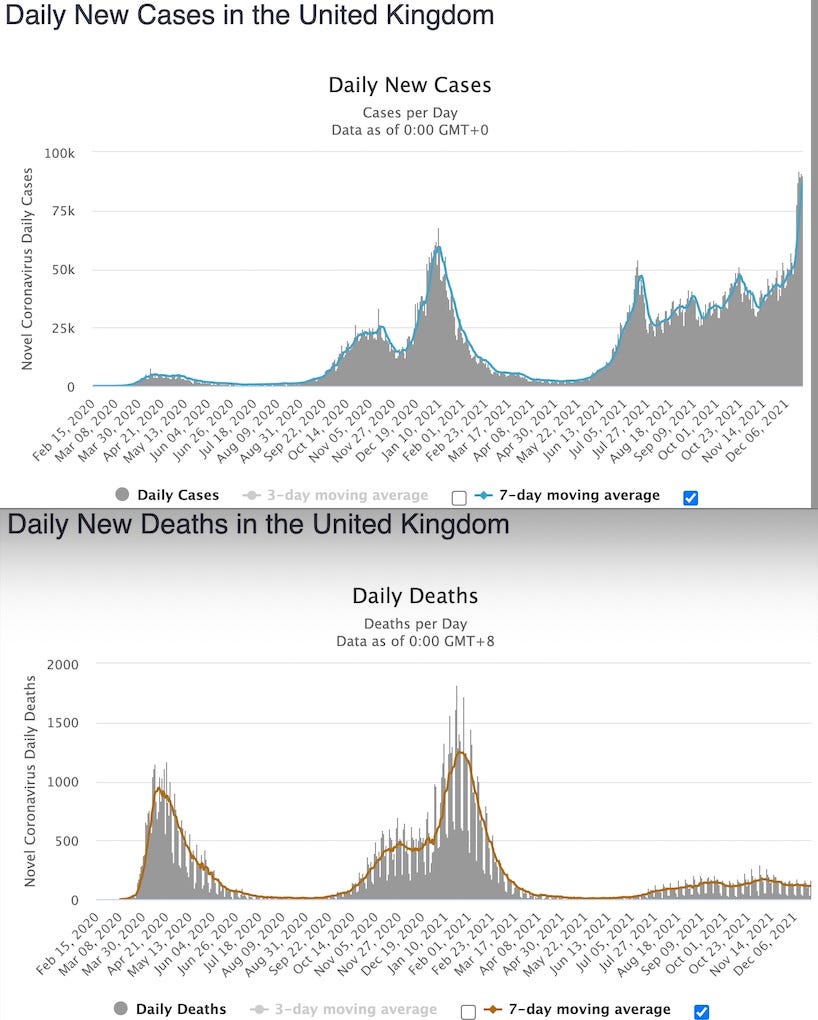Free Market Capitalism Trumps Free Trade Gesticulation
GOP senator blithely muses about nuking Russia
Writing in The Australian, I argue that free market capitalism will drive economic advancement in Asia-Pacific more than trade pacts.
Also in this edition, I enclose the latest episode of Simon & Whiton, lament a GOP senator threatening nuclear war, and wonder whether Omicron is a Christmas blessing.
Real free market reform will outshine trade blocs
CHRISTIAN WHITON
DECEMBER 22, 2021
South Korea’s announcement that it wants to join the Comprehensive and Progressive Agreement for Trans-Pacific Partnership, of which Australia is a member, will be welcome news to conventional trade advocates. Those who favour a Pacific economic regime that deprioritises China also will be heartened.
But the real-world impact will be limited, and a mechanism to spur free market capitalist economic reform could be more important to a region that is stagnating.
In the US, the trade debate, such as it is, has changed so much in the past five years that neither political party sees any upside in multilateral deals or even big bilateral deals. Politicians and some experts see them as exporting jobs and failing to create economic growth.
Multilateral trade deals are often disappointing. The CPTPP will not help any member economies or investors deal with the biggest recent change in Asian economics: China’s left turn under the guidance of Xi Jinping, who has prioritised Communist Party control over economic expansion and wealth. The trade pact also will do little to reverse relative stagnation across much of East Asia.
The Biden administration is talking up a vague Indo-Pacific Economic Framework. If it comes to pass, it will be heavy on export controls and higher energy costs in the name of fighting climate change, neither of which will increase wealth. A more useful supplement to the CPTPP would be a mechanism to encourage free market capitalist reform – whether or not it involves the US.
Countries in the region should consider America’s 2017-19 economic boom, which was halted only by the pandemic. Economists previously asserted that the US economy was subject to “secular stagnation” and economic growth greater than 2 per cent was unlikely. Gross domestic product grew an annual average of 1.6 per cent during the Obama years. Real wages stagnated and manufacturing continued its decline.
The Trump administration rejected the idea that higher economic growth was unobtainable. Trump signed tax cuts that included a decrease in corporate levies. The biggest impetus to growth may have been a reduction in government regulations. Just as important was Trump’s tone. Gone was the anti-business rhetoric and steadily creeping regulations of previous administrations that increased central control on everything from healthcare to the environment. Reversing this trend gave investors and businesses the courage to invest and spend.
Even if they cannot formally call it a capitalist advocacy body, governments in East Asia and the Pacific with free market economies should create a grouping and set of recurring events and information mechanisms to advocate free market reform. Rather than seeking to embarrass any particular government, the point would be to give governments in the region the political coverage they need to implement reforms. The diverse members could range from capitalist entrepot Singapore to staid heavyweight Japan and troubled backwater Myanmar.
Capitalism for capitalism’s sake does not have much populist appeal. However, what would have political appeal is helping members such as Japan and South Korea evade stagnation and decline, and helping much of the rest of the region avoid the middle-income trap whereby per capita incomes never reach those of the world’s top-tier economies.
Only real free market reform can raise wages and escape the trap. Combining the CPTPP with a free market capitalist reform body will create new tiger economies and help weather whatever storm is coming from China.
URL: https://bit.ly/3JdwPo7
Rio Tinto and West Side Story
In the latest edition of Simon & Whiton, Mark and I discussed whether Rio’s new panda hugger CEO will wokify the company, or whether shareholders in the mining giant might actually insist that the company mine things instead of sell cappuccinos and produce decarbonized films about gay cowboys.
How I Learned to Love the Bomb
The generally solid Senator Roger Wicker (R-Mississippi) made a startling claim about confronting Russia on Fox’s Cavuto. His full comment:
Military action could mean that we stand off with our ships in the Black Sea and that we rain destruction on Russian military capabilities. It could mean that we participate—and I would not rule that out—I would not rule out American troops on the ground. We don’t rule out first-use nuclear action. We don’t think it’ll happen. But there are certain things in negotiations if you’re gonna be tough that you don’t take off the table.
Wicker was talking more about posturing in negotiations than military strategy, but there comes a point where those things must converge in the real world if either is to be credible. A first use of nuclear weapons would create what the nuclear war gamers of old called the opposite of “crisis stability.” That condition is one where neither side has a perceived incentive to escalate nuclear war. Wicker’s condition would lead to a situation where Russia would retaliate with a larger response from its ample nuclear arsenal, prompting a subsequent U.S. response (you can bet the French and Brits would sit this one out), and the cycle would repeat. That should raise the question of whether corrupt and divided Ukraine is worth uncapping the nuclear genie for the first time since 1945 and causing potentially millions of deaths.
I’ve previously written about the insanity of making a stand in the Black Sea. The 1936 Montreux Convention strictly limits the size and type of warships that non-Black Sea states (us) can put into the body of water, while leaving Black Sea states (Russia) a much freer hand. Typically the most we can put into the Black Sea is a single destroyer or one of our dwindling number of TICO cruisers plus a “command ship” armed with only last-ditch defensive weapons. The Brits or French might also have a warship in the sea, but they would definitely not be game to go to war for reals. Therefore, Wicker’s “stand off with our ships in the Black Sea and that we rain destruction on Russian military capabilities” idea would mean a single U.S. destroyer lobbing at best up to 50 Tomahawk missiles at a country of 144 million with the world’s fourth-largest military, and which, as the Soviet Union, was willing to incur 8.7 million military deaths fighting the last country that attacked Russia. Also, many of the subsonic Tomahawks, which take off like a rocket but then fly level like a plane, would never reach their targets; and the U.S. warship and her crew would promptly fall prey to Russian naval or air power.
Wicker isn’t just any senator. He is actually the second-ranked Republican on the Armed Services Committee (behind spritely 87-year-old Jim Inhofe). Unfortunately, what he exhibited in this case is a widespread view across the failed national security establishment that runs any situation through a World War II or Cold War scenario, when in fact the Russia-Ukraine problem fits neither. Furthermore, the analysis fails to incorporate some basic realities including: i) we are broke, having found the point at which additional federal spending will lead to crippling inflation; ii) having wasted trillions playing cowboys and indians in Middle East backwaters, we cannot afford to play pretend imperial manager everywhere and must choose priorities (i.e., deterring China and Iran); and iii) NATO talks tough, but is just a mechanism to get us to pay for the defense of rich European nations that screw us on trade, most of which would call in sick if there were an actual war, especially one with Russia.
There is also the small matter that Republicans like Wicker should sense that Ukraine deserves to be punished for the role of its glee club and lobbyists in undermining the Trump presidency. Or, if not punished, Kiev at least does not warrant any special friendship from Republicans, or the commitment of U.S. forces or arms sales. There needs to be a consequence for foreign governments that aid leftwing forces in the USA.
Meanwhile, the Biden administration is pursuing its unique (three-dimensional?) form of negotiations with Russia, whereby it rules out any and all concessions but then professes a desire to engage in diplomacy “through multiple channels.” Moscow, which wants further NATO expansion into its front yard halted, might wonder what then is the purpose of such diplomacy. Those of us who did not attend the Harvard Kennedy School foolishly suppose negotiation might need to involve give-and-take and a sense by both parties that they are better off with a deal.
This approach by Biden’s people is an interesting offshoot of the Democrat view that simply attending things suffices for statecraft. For example, when a masked Joe Biden showed up at the G7 to fist bump Boris Johnson and the other globalist fools, he said:
America is back at the table. The lack of participation in the past and full engagement was noticed significantly, not only by the leaders of those countries, but by the people in the G7 countries. And America is back in the business of leading the world alongside nations who share our most deeply held values.
There you have it: the people of the other G7 countries were so very upset that Trump officials slightly scaled back diplotourism by occasionally downgrading the level of official sent to gatherings that achieve nothing more than pointless statements that are forgotten before the ink they are printed with dries.
An even more pronounced version of this establishment view was practiced by Hillary Clinton when she was Secretary of State and had a web page devoted to the number of countries she had visited and miles she had flown. (She was visiting the Cook Islands in the South Pacific when terrorists in Libya were in the final stages of preparing their attack that sacked our embassy and killed our ambassador). This led to one of the better burns of the 2016 presidential campaign cycle when Carly Fiorina quipped: “Mrs. Clinton, flying is an activity not an accomplishment.”
Biden’s spin on Hillary’s model of negotiation is to accompany it with stark language, like calling Russian President Putin “a killer.” (Similarly, the White House recently called Senator Joe Manchin “a liar,” which is sure to bring him around.) Insult the other party, refuse any give-and-take, but have lots of calls and gatherings. It’s bound to work!
Omicron
The indispensable Conrad Black called the Xi, err Omicron variant of WuFlu “a Christmas blessing.” He might be right if you consider that as Omicron spread through South Africa, the death and hospitalization rates have been flat or declined. Britain is following a somewhat similar pattern: cases up, deaths and hospitalizations flat or down. That reality hasn’t stopped a freakout from lefty politicians and honorary members of the Left like Britain’s clown of a prime minister, Boris Johnson, or Israel’s otherwise powerless head of government, Naftali Bennett. In fact, Israel (like Japan and Taiwan) is closed to foreigners again—a reminder of the current power in that country of bossy paternalists who wandered too far off the kibbutz.
Back here on the kibbutz known as Democrat-run America, increasingly pointless Joe Biden announced that millions of rapid tests will be sent to Americans who don’t want or need them. Meanwhile, Anthony Fauci, who was elevated to his current prominent role by Donald Trump, mused that we may never be able to dispense with masks on planes, even though two major airline executives recently stated what should be obvious to everyone given COVID numbers: masks don’t work.
The following charts imply that Omicron will mean cases up, deaths relatively flat, natural immunity up.
Finally, in a look back at the year that was, on Fox Business I discussed whether there was any positive part of Biden foreign policy, and took a guess as to why he smiled at a question of holding China accountable for killing 800,000 Americans.
Merry Christmas!










